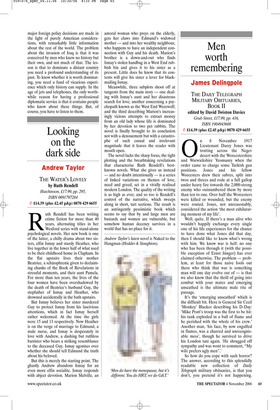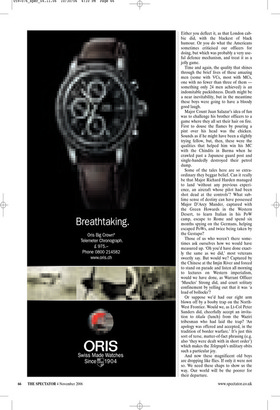Men worth remembering
James Delingpole
THE DAILY TELEGRAPH MILITARY OBITUARIES, BOOK II edited by David Twiston Davies Grub Street, £17.99, pp. 416, ISBN 1904943608 ✆ £14.39 (plus £2.45 p&p) 0870 429 6655 On 8 November 1917 Lieutenant Darcy Jones was trotting across the Negev desert with the Worcestershire and Warwickshire Yeomanry when the order came to charge some Turkish gun positions. Jones and his fellow Worcesters drew their sabres, split into twos and threes and rode at a full gallop under heavy fire towards the 2,000-strong enemy who outnumbered them by more than ten to one. Over half the Worcesters were killed or wounded, but the enemy were routed. Jones, not unreasonably, considered the action ‘the most exhilarating moment of my life’.
Well, quite. If there’s a man alive who wouldn’t happily exchange every single one of his life experiences for the chance to have done what Jones did that day, then I should like to know what’s wrong with him. We know war is hell: no one who has been through it (with the possible exception of Ernst Jünger) has ever claimed otherwise. The problem — problem, at least for those naive fools out there who think that war is something man will one day evolve out of — is that we also know that the thrill of going into combat with your mates and emerging unscathed is the ultimate male rite of passage.
It’s the ‘emerging unscathed’ which is the difficult bit. Here is General Sir Cecil ‘Monkey’ Blacker describing his D-Day: ‘Mike Pratt’s troop was the first to be hit: his tank exploded in a ball of flame and he perished with the whole of his crew.’ Another man, ‘his face, by now engulfed in flames, was a charred and unrecognisable mess’, though he survived to drive his London taxi again. ‘He shrugged off sympathy and was wont to comment, “My wife prefers ugly men”.’ So how do you cope with such horror? The answer, according to this splendidly readable new collection of Daily Telegraph military obituaries, is that you don’t, you pretend it’s not happening. Either you deflect it, as that London cabbie did, with the blackest of black humour. Or you do what the Americans sometimes criticised our officers for doing, but which was probably a very useful defence mechanism, and treat it as a jolly game.
Time and again, the quality that shines through the brief lives of these amazing men (some with VCs, most with MCs, one with no fewer than three of them something only 24 men achieved) is an indomitable puckishness. Death might be a near inevitability, but in the meantime these boys were going to have a bloody good laugh.
Major Count Juan Salazar’s idea of fun was to challenge his brother officers to a game where they all set their hair on fire. First to douse the flames by pouring a pint over his head was the chicken. Sounds as if he might have been a slightly trying fellow, but, then, these were the qualities that helped him win his MC with the Chindits in Burma when he crawled past a Japanese guard post and single-handedly destroyed their petrol dump.
Some of the tales here are so extraordinary they beggar belief. Can it really be that Major Richard Harden managed to land ‘without any previous experience, an aircraft whose pilot had been shot dead at the controls’? What sublime sense of destiny can have possessed Major D’Arcy Mander, captured with the Green Howards in the Western Desert, to learn Italian in his PoW camp, escape to Rome and spend six months spying on the Germans, helping escaped PoWs, and twice being taken by the Gestapo?
Those of us who weren’t there sometimes ask ourselves how we would have measured up. ‘Oh you’d have done exactly the same as we did,’ most veterans sweetly say. But would we? Captured by the Chinese at the Imjin River and forced to stand on parade and listen all morning to lectures on Western imperialism, would we have done, as Warrant Officer ‘Muscles’ Strong did, and court solitary confinement by yelling out that it was ‘a load of bollocks’?
Or suppose we’d had our right arm blown off by a booby trap on the NorthWest Frontier. Would we, as Lt-Col Peter Sanders did, cheerfully accept an invitation to tikala (lunch) from the Waziri tribesman who had laid the trap? ‘An apology was offered and accepted, in the tradition of border warfare.’ It’s just this sort of terse, matter-of-fact phrasing (e.g. also ‘they were dealt with in short order’) which makes the Telegraph’s military obits such a particular joy.
And now these magnificent old boys are dropping like flies. If only it were not so. We need these chaps to show us the way. Our world will be the poorer for their departure.



















































































































 Previous page
Previous page